COOPERATION MODEL
ARTIFICIAL INTELLIGENCE
PRODUCT ENGINEERING
DevOps & Cloud
LOW-CODE/NO-CODE DEVELOPMENT
INDUSTRY
FRONTEND DEVELOPMENT
CLOUD DEVELOPMENT
MOBILE APP DEVELOPMENT
LOW CODE/ NO CODE DEVELOPMENT
EMERGING TECHNOLOGIES







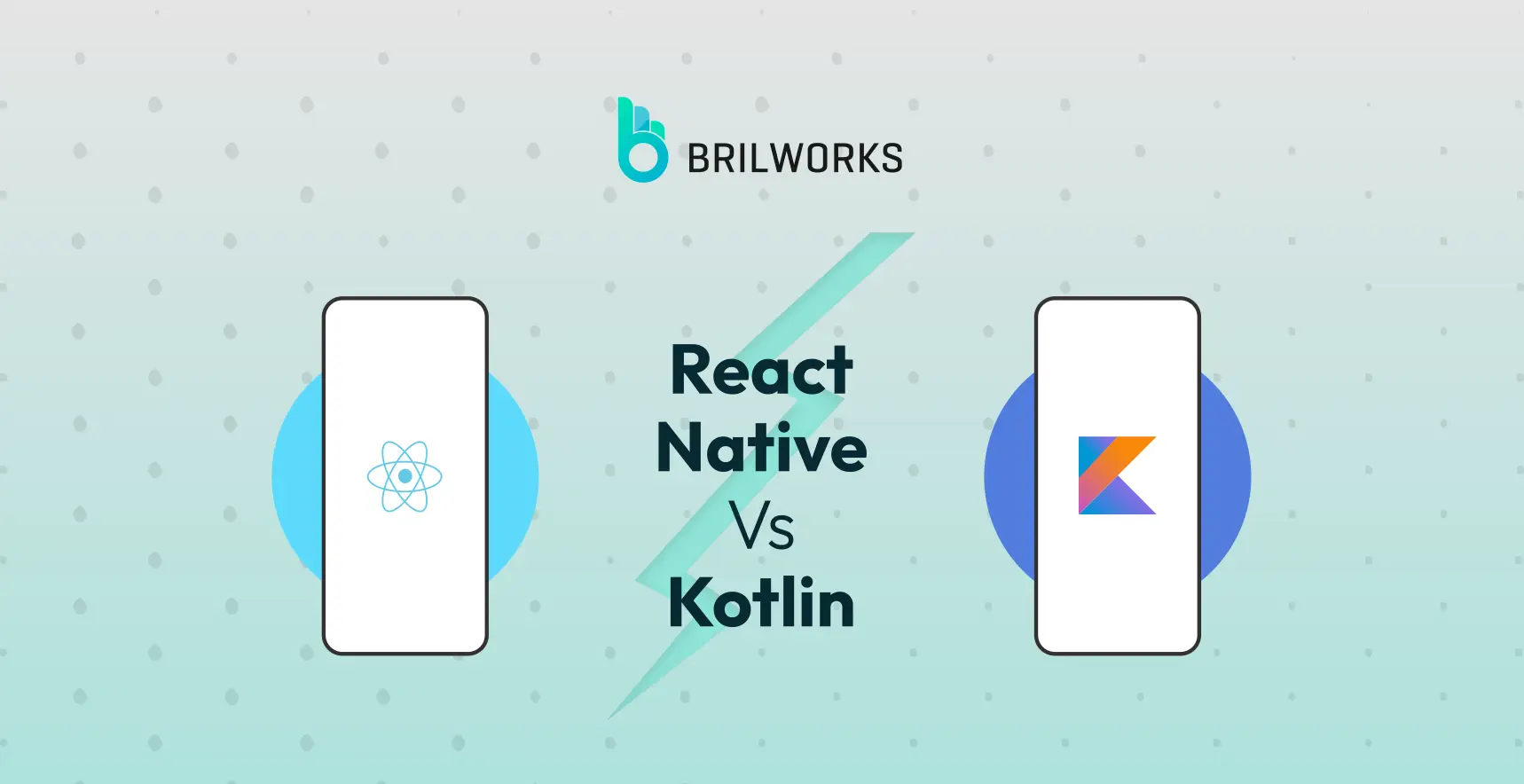
We’re going to learn about React Native vs Kotlin, but first, let’s understand what each is and where it fits in the big scheme of things. They are quite different things, but they are compared as both are used for the same general purposes. React Native was developed by Facebook and is used by many well-known companies. Tesla, Pinterest, Shopify, Meta, Microsoft, and Wix are popular React Apps. It is well-documented and well-supported by a large, active community. Kotlin is JetBrains' product, which companies like Google, Twitter, Reddit, Netflix, Uber, BMW, Coursera, Slack, and Trello use in their product development.
Both have a strong track record. In terms of popularity, Kotlin community is still smaller than that of React Native. However, its status as Google’s preferred language for Android development gives it an edge in that cross-platform development world.
In terms of popularity, they are both widely praised. React Native has been the second most-used framework since 2019, while Kotlin is 4th most popular language since 2018. React Native allows developers to develop multiplatform apps using one codebase, while Kotlin is interoperable with Java.
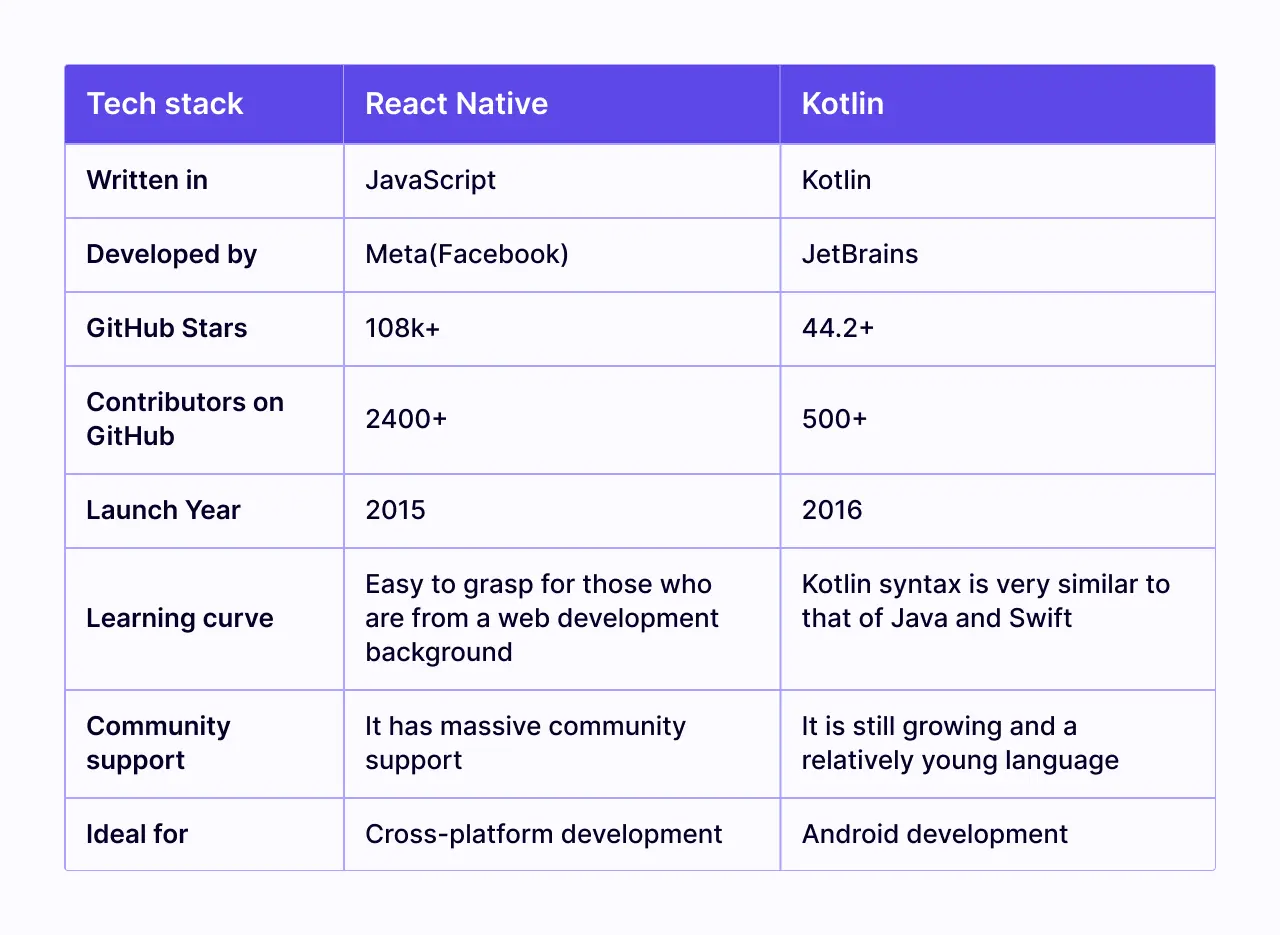
Let's make it clear, Kotlin is a programming primarily used in Android app development, however with Kotlin Multiplatform, which is a technology, you can leverage Kotlin programming language for multi-platform application development including Android and iOS.
React Native is a JavaScript-based framework that helps developers build high-performing apps for both iOS and Android. Facebook developed React Native as an extension of its popular ReactJS library.
React Native has quickly gained popularity amongst developers, especially since it enables them to develop cross-platform apps without spending time learning two or more languages.
The main advantage of React Native is that it allows linking to native components, so programmers don't have to write native code to work on operating systems. Moreover, React Native leverages functional components to create modular and maintainable user interfaces.
This helps React Native app developers to make apps that look and feel like native apps. React Native is widely used and is in many big name apps such as Discord, Wix, and Walmart. This popularity is partly due to the framework's efficient architecture, where functional components simplify state management and enhance code reusability.
Kotlin is indeed a native language for Android development. Google officially adopted it as a first-class language for Android in 2017, and since then, it’s become the preferred choice over Java for building native Android apps. When you write Kotlin for Android using the Android SDK, it compiles down to bytecode that runs on the Android Runtime (ART), making it fully native in that sense.
The cross-platform angle with Kotlin Multiplatform (KMP) builds on this native foundation. With KMP, you’re still writing Kotlin that can target Android natively, but you’re also sharing code with other platforms (like iOS, desktop, or web) by abstracting the platform-specific parts. For Android, it’s as native as it gets—no bridges or wrappers like React Native—just straight Kotlin talking to Android APIs.
So, in short: yes, Kotlin is a native Android language at its core, and its cross-platform capabilities are an extension of that native strength, not a replacement. Does that match what you were thinking?
Kotlin is an object-oriented, statically typed, and functional programming language. JetBrains developed Kotlin in 2011. Although it was around for a while, it became widely popular after Google declared it the official language for Android app development at its 2017 I/O. This decision aimed to take Android to the next level.
Kotlin can be used for cross-platform development, though it works a bit differently than React Native. While React Native uses JavaScript (or TypeScript) to build apps for both iOS and Android via a single codebase, Kotlin's cross-platform capabilities are most prominently seen through frameworks like Kotlin Multiplatform (KMP).
With Kotlin Multiplatform, you can write shared logic (like business rules, data handling, or networking code) in Kotlin and then pair it with platform-specific code for UI or native features. For example, you could use Kotlin to target Android natively (via Android SDK), iOS (via Swift interoperability or Jetpack Compose Multiplatform), desktop, and even web applications. This is different from React Native, which relies on a JavaScript bridge and a unified UI framework to render native components.
So, while Kotlin isn’t inherently "cross-platform" in the same turnkey way React Native is, it becomes a powerful cross-platform tool with KMP. Developers love it because it’s strongly typed, concise, and integrates with existing Java codebases, plus it’s backed by JetBrains and Google (especially for Android).
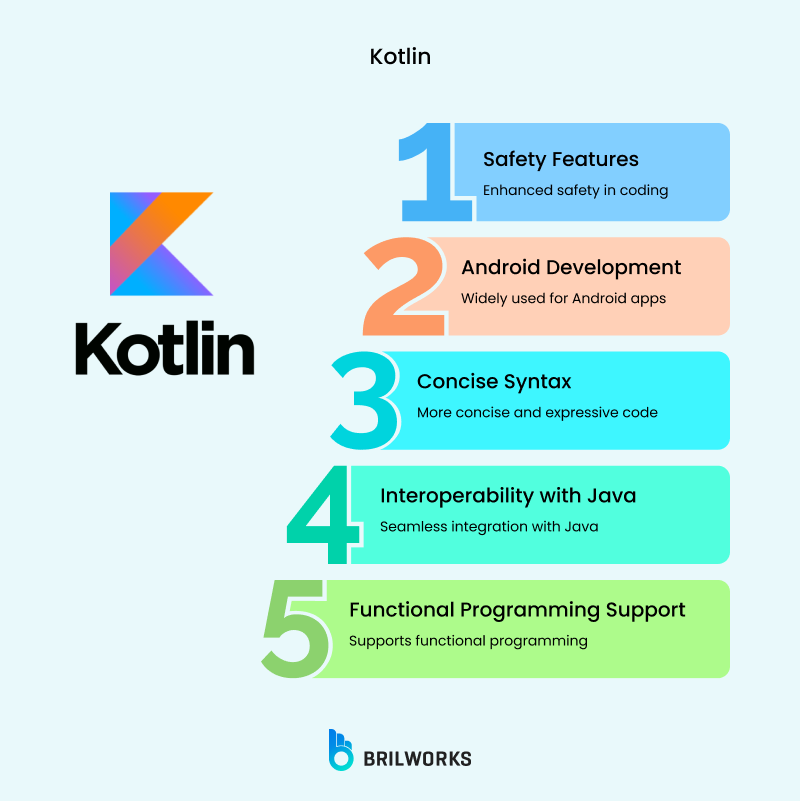
React Native is a good choice, even though there are also certain cons to consider. First, it provides the ability to create apps that can run on both iOS and Android, offering a great approach when you need to build apps for both platforms simultaneously.
Also, as the open-source nature of React Native provides free access to various components and tools. Developers can utilize this feature to build apps efficiently.
React Native also provides a vast array of JavaScript and native modules. Finally, with its ability to be used for the development of large-scale applications, developers have a way to create applications that can scale to handle a huge number of requests without sacrificing performance.
React Native is an excellent choice when you want to:
Build a cross-platform application that needs to work on both Android and iOS.
Develop an app that needs to be quickly released and updated.
Access a wide library of JavaScript and Native Modules to speed up the development process.
Build a large-scale application that needs to be responsive and reliable.
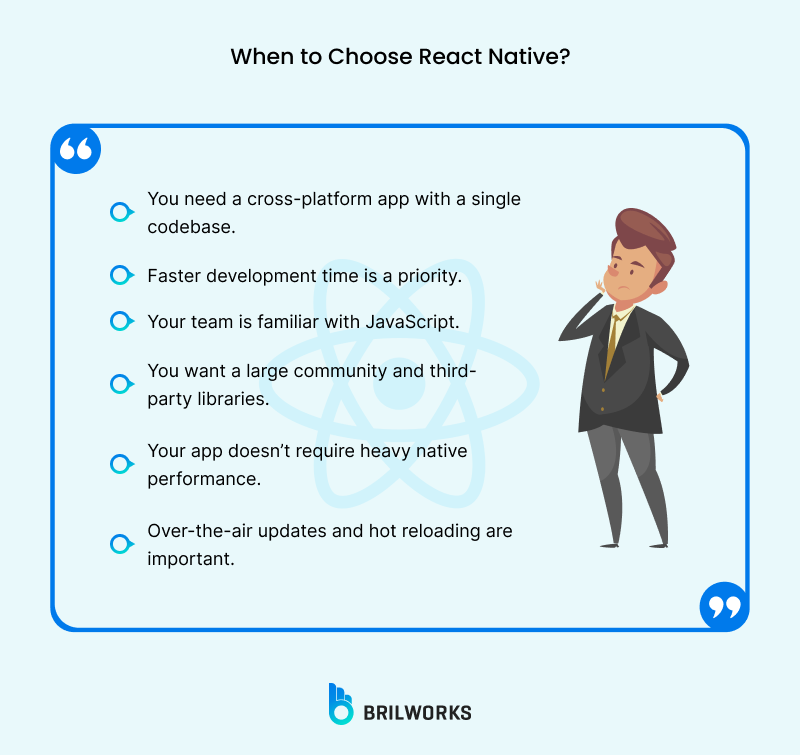
In cases where you have a lot of Java code and want to reduce it, Kotlin can help. It can coexist with existing Java code and is designed to integrate easily with it. As a result, it's great for optimizing Java projects. It also speeds up the development process by reducing the amount of code needed to implement the same functionality. Fewer lines of code are required to accomplish the same functionality with Kotlin compared to Java. This is thanks to the streamlined syntax, which makes it simpler for developers to read and write code because it removes unnecessary keywords. Look at the below programs, which are written in Java and Kotlin:
Hello world program in Kotlin
fun main(args : Array<String>) {
println("Hello, World!")
}Hello world program in Java
class HelloWorld {
public static void main(String[] args) {
System.out.println("Hello, World!");
}
}Assuming your current app is developed using Java and you want to scale Kotlin is the best choice overall for developing an Android app, if you look at factors such as ease of use, overall project time, cost, and output, Kotlin comes out on top.
This is an important question for anyone deciding to create an Android app because the answer affects the quality, speed, and cost of the project. It’s also important to look at the pros and cons of each choice in order to figure out which is the better option.
If you had to choose between Kotlin and React Native when developing an Android app, which would you choose?
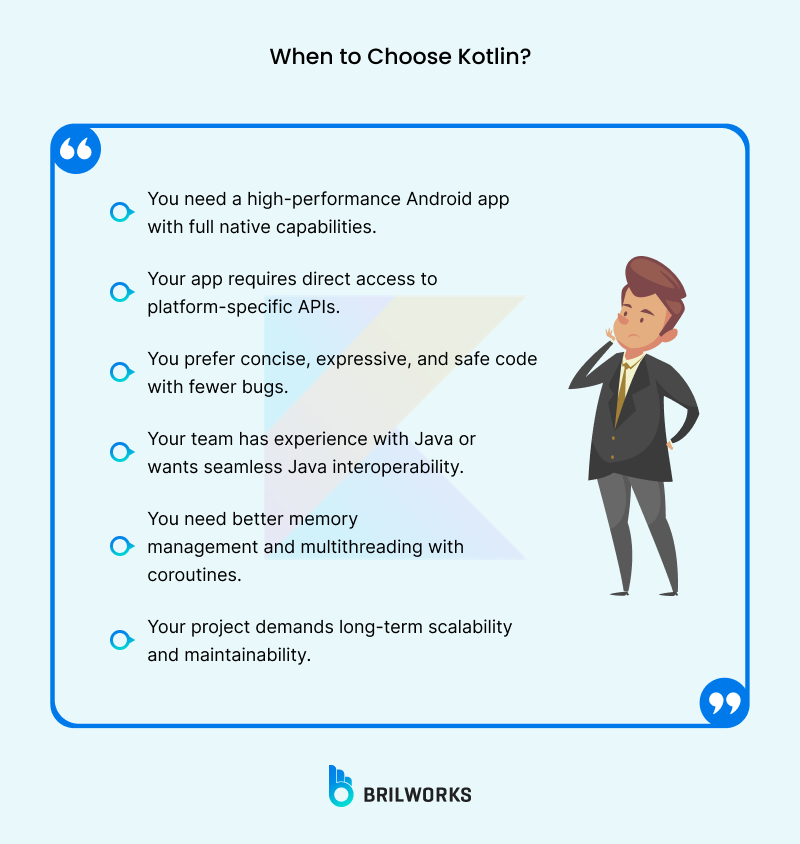
React Native empowers developers with cutting-edge tools and technical capabilities that streamline mobile app creation. Below are the features that make it a favorite among coders, especially when pitted against Kotlin’s native strengths.
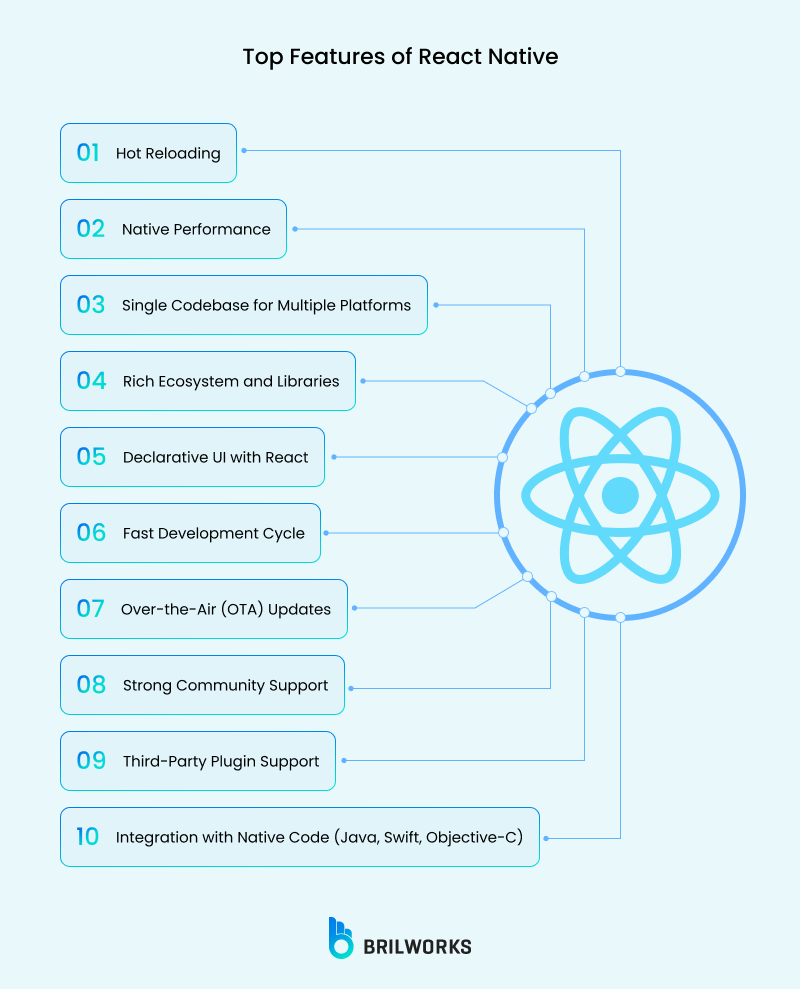
This is a critical feature that distinguishes React Native from other frameworks. Hot reload reflects the changes in components made through coding without affecting the entire app state. The changes made in the code can be observed instantly, even without refreshing the full page. Thus, this reduces development time substantially and makes development fast.
Native performance gives React Native an edge with its ability to match platform-specific speeds. The New Architecture optimizes how apps run, delivering smooth, fast experiences. This makes it a strong choice for high-quality mobile apps.
The New Architecture makes React Native faster and smoother with Turbo Modules and Fabric. Turbo Modules load native code only when needed, cutting startup time. Fabric improves UI rendering for a native-like feel.
Over-the-Air updates push fixes and features straight to users’ apps. This skips app store delays for JavaScript changes, speeding up releases. It’s a key perk for quick updates and maintenance.
Functional components are a vital part of React Native’s efficient UI building process. They use simple functions with hooks to create dynamic, reusable interfaces quickly. This approach supports hot reloading and simplifies coding for developers.
The developer ecosystem offers a rich set of tools and libraries for React Native projects. Options like Expo, React Navigation, and community packages speed up development. This vast support network enhances flexibility and productivity.
Code simplicity streamlines app creation with React Native’s clear, concise syntax. It reduces boilerplate compared to native development, making coding faster. This ease attracts developers seeking efficient workflows.
Turbo Modules streamline native module loading for better performance. They initialize only when needed, cutting app startup time significantly. This technical upgrade makes React Native more efficient for complex projects.
Fabric Renderer enhances UI responsiveness with a new rendering system. It processes components on a separate thread, improving frame rates and smoothness. This gives developers finer control over native-like visuals.
The JavaScript Bridge connects React Native’s JS runtime to native platforms. It enables direct calls to iOS and Android APIs, enhancing functionality. This technical link supports custom native integrations.
Type safety boosts code reliability with TypeScript integration. It catches errors early during development, reducing runtime bugs. This feature appeals to developers prioritizing robust, maintainable codebases.
Kotlin offers technical precision and Android-native strengths that rival React Native’s cross-platform appeal. Here are the top features that make it a top choice for coding pros.
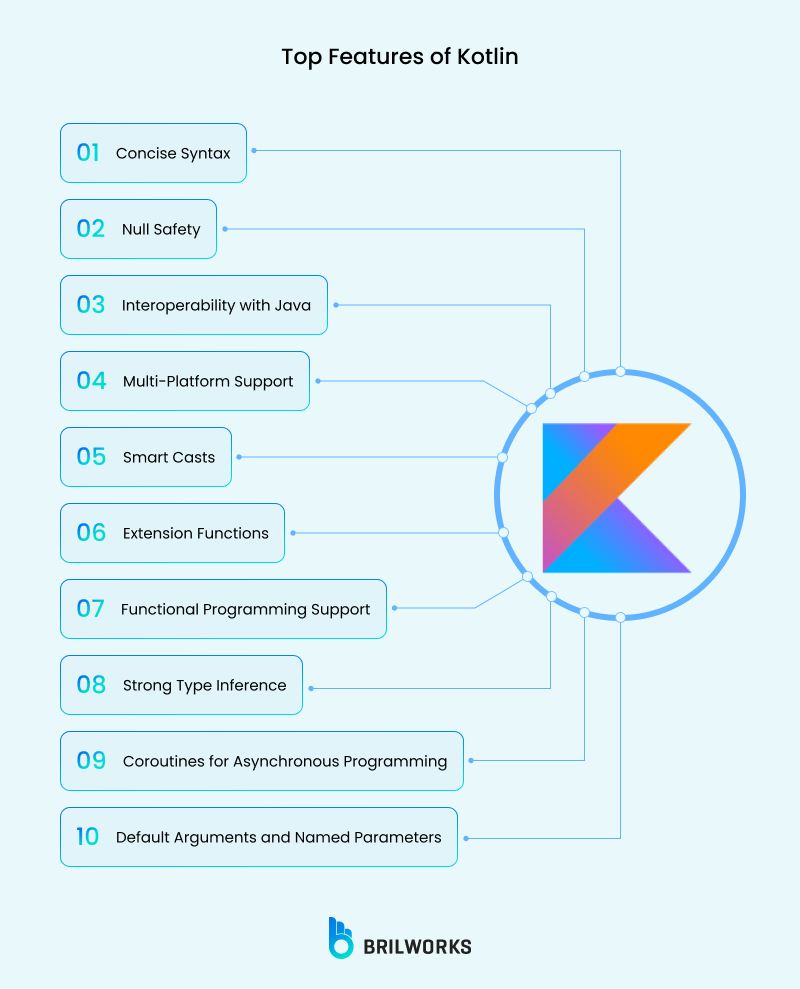
Lazy loading delays the initialization of resources until they’re actually needed. This reduces app startup time by loading only essential components first. It’s a technical boost for faster, more efficient applications.
Java interoperability allows seamless conversion of Java code into Kotlin. This shrinks verbose Java syntax into concise Kotlin equivalents effortlessly. It’s a practical feature for developers migrating or mixing codebases. A Kotlin wrapper can further enhance this integration by encapsulating complex Java libraries or Android APIs into simpler, reusable Kotlin code.
Native control gives developers full command over Android’s platform-specific elements. Kotlin’s status as Android’s preferred language ensures direct access to native APIs. This precision outshines cross-platform stacks like React Native.
Coroutines simplify asynchronous programming with lightweight threads. They handle tasks like network calls or database operations without blocking the main thread. This technical edge enhances app responsiveness and scalability.
Null safety eliminates null pointer exceptions at compile time. Kotlin’s type system flags potential null issues before they crash the app. It’s a critical feature for robust, error-free code.
Extension functions let developers add functionality to existing classes without altering their source. This keeps code modular and readable, boosting productivity. It’s a technical perk for cleaner, reusable solutions.
Smart casts automatically handle type casting when conditions are met. This reduces boilerplate and makes code more concise and safe. It’s a developer-friendly feature for efficient workflows.
React Native delivers big-picture wins that make it a standout choice for developers. These pros focus on the real impact for your projects.
One of the significant advantages it offers over Kotlin is that the same code can be shared across various platforms. This means eliminating the need for separate teams of developers for different platforms.
React Native cuts build times with its streamlined tools and workflows. Developers iterate quickly without complex native setups. This speed gets apps to market sooner.
JavaScript skills open React Native to a wide range of coders. Web developers can jump in without learning deep native systems. It’s a practical perk for hiring and scaling teams.
When it comes to choosing a language for any kind of tech development, we can’t ignore the benefits of the developer community. The community acts as a support system. So, when you are stuck, you can seek assistance from other developers across the globe.
Even with its strengths, React Native has its downsides for developers to consider. These cons highlight real-world challenges.
React native apps are impressively fast, but still, native apps are faster in terms of performance. React Native apps comprise a bridge called “React Native bridge” between the UI thread and the JavaScript function as a bottleneck.
Upgrading from one version to the latest version can be a tedious task. Even a small mistake can cause a delay in upgrading to the latest version, providing users with plenty of new features and tools to improve application performance.
Since it appears to be a perfect language for Native app development with a great number of modules to build a variety of components, it still lacks some custom modules, and you might be forced to create components from scratch.
Kotlin brings strategic benefits that solidify its role in Android development. These pros emphasize its value beyond the code.
As compared to Java, Kotlin syntax is more concise, reducing the significant amount of boilerplate code needed to declare variables, classes, and methods.
Google strongly recommends using Kotlin for Android development; many new APIs, such as Android FTX, JetPack compose, etc., are built around Kotlin.
It is a functional programming language that features modularity and reusability, concurrency and parallelism, concise coding, etc., making it a great choice for modern app development.
Kotlin’s gains come with some limitations that can’t be ignored. These cons point out its practical drawbacks.
While Kotlin has gained significant popularity and adoption in recent years, it is still a relatively new programming language compared to others, like Java. As a result, the resources and community of developers available to support and assist with Kotlin development may be more limited compared to other languages.
This can sometimes make it challenging for developers to get help or find answers when facing problems or challenges during app development with Kotlin.
Even though it is considered an enhanced version of Java, it is comparatively slower than Java in terms of the speed of applications in the Android ecosystem.
Though it has been reaching a new height with the passing years, it has yet to achieve the milestone of a list of matured programming languages. So, when you are in trouble with your app, you may find it difficult to get assistance from the developers’ community as they are limited in number.
Building apps with Kotlin React Native demands specific setups. Here’s what developers need to get started with each.
Runs on Windows, macOS, or Linux with Node.js (v16+ recommended) and npm/yarn installed.
Requires Android Studio for Android development or Xcode (macOS only) for iOS, plus an emulator or physical device.
Needs 8GB RAM minimum, though 16GB is ideal for smooth performance with emulators.
Works on Windows, macOS, or Linux with Android Studio (latest stable version) as the primary IDE.
Requires JDK 11+ for compilation and an Android emulator or device for testing.
Demands at least 8GB RAM, with 12GB+ recommended for faster builds on complex projects.
React Native and Kotlin excel in different scenarios. These use cases show where each thrives for developers.
Ideal for startups needing quick MVP launches across iOS and Android with one codebase.
Suits apps with moderate UI needs, like social media (e.g., Instagram) or e-commerce platforms.
Best for teams leveraging JavaScript skills to iterate fast on dynamic content apps.
Perfect for Android-first apps requiring deep native integration, like banking or fitness trackers.
Fits large-scale projects needing robust performance, such as enterprise tools (e.g., Trello).
Great for developers building with Jetpack Compose or maintaining Java-based codebases.
React Native and Kotlin have carved distinct paths in the dev world by 2025. Here’s how adoption trends stack up.
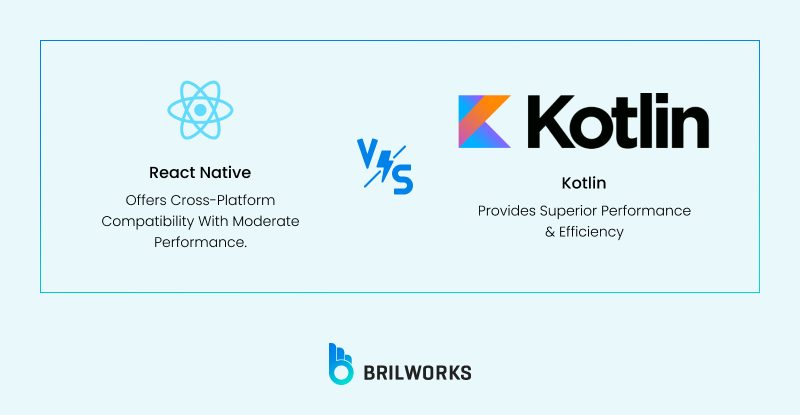
Holds strong with 35% of developers using it for cross-platform work, thanks to its JavaScript base.
Adoption thrives among startups and web-centric teams, with giants like Facebook and Airbnb boosting its cred.
Growth has slowed slightly as Flutter gains ground, but its mature ecosystem keeps it a top pick.
Used by 60% of Android developers, up from 40% in 2020, fueled by Google’s push and Jetpack Compose adoption.
Multiplatform use (KMP) is rising, with 15% of devs experimenting cross-platform, seen in apps like Netflix.
Strong in Android-first markets, though its smaller community limits broader uptake compared to React Native.
Performance matters in mobile apps—users expect fast load times, smooth interactions, and efficient resource use. So, how do these two compare? Let’s explore the benchmarks.
Startup time measures how quickly an app launches and becomes usable. This is often the user’s first impression of an app.
Kotlin:
Native Android apps built with Kotlin typically have faster startup times. Since the code compiles directly to bytecode for the Android runtime, there’s no additional overhead. The app initializes using the platform’s optimized pathways, resulting in snappy launches.
React Native:
React Native apps require the JavaScript engine to boot up and establish a bridge between the JavaScript thread and native components. This introduces a slight delay, especially noticeable in complex apps with heavy initialization logic. For simpler apps, the gap is minimal, but it widens as complexity grows.
Verdict: Kotlin wins here. Native execution skips the runtime overhead that React Native incurs.
Memory efficiency is critical on mobile devices, where resources are constrained.
Kotlin:
Native apps use memory more efficiently because they tap directly into Android’s memory management system. There’s no need for extra layers, keeping memory footprints lean.
React Native:
React Native juggles memory for the JavaScript runtime, the bridge, and native modules. This multi-layered approach increases memory usage. For example, a developer once reported reducing idle memory usage by 21 times after rewriting a React Native app in Kotlin—an extreme but telling case.
Verdict: Kotlin takes the lead. React Native’s additional runtime layers inflate memory demands, though optimizations like lazy loading can help mitigate this.
CPU usage affects battery life and app responsiveness, especially during intensive tasks.
Kotlin:
As a statically typed, compiled language, Kotlin runs natively on Android, minimizing CPU overhead. It directly accesses device capabilities without intermediaries, making it efficient for heavy computations.
React Native:
React Native runs JavaScript in a separate thread, communicating with native code via a bridge. This bridge can become a bottleneck, increasing CPU usage during complex operations. For lightweight apps, the difference is subtle, but it scales with app intensity.
Verdict: Kotlin is more CPU-efficient. React Native’s threading and bridge introduce overhead that native execution avoids.
Smooth animations are essential for a polished user experience, typically measured in frames per second (FPS).
Kotlin:
Native Android apps handle animations via the platform’s optimized rendering pipelines, ensuring high frame rates and fluid interactions. The direct access to hardware keeps animations smooth, even under load.
React Native:
Historically, React Native animations run on the JavaScript thread. If that thread gets bogged down, frames drop, leading to jank. However, tools like Reanimated v3 shift animation logic to the native side, closing the gap. Still, out-of-the-box animations in React Native lag behind native performance.
Verdict: Kotlin excels for smooth animations. React Native has improved, but native rendering remains superior for consistent FPS.
App size impacts download times and storage usage—key concerns for users.
Kotlin:
Native Kotlin apps are compact, bundling only the compiled code and necessary resources. No extra runtimes or libraries are required.
React Native:
React Native apps include the JavaScript runtime and dependencies, inflating their size. One developer noted an 11.5x size reduction after switching to Kotlin. Techniques like code splitting and tree shaking can trim React Native apps, but they still tend to be larger.
Verdict: Kotlin produces smaller apps. React Native’s cross-platform benefits come at the cost of a heftier package.
It’s tough deciding between React Native and Kotlin when you’re looking to develop a mobile app that functions well on both iOS and Android. These platforms have been leading the pack for mobile apps, and for good reason. They’re high-quality, responsive, and reliable, so you can get the results you need. However, they’re also quite different, so deciding which is better for your project can be tricky.
When choosing between React Native and Kotlin, think about what your project needs. React Native is a great choice if you're planning to release apps quickly. It's a good way to write apps that can work on both iOS and Android. It also makes it easy to update your apps often.
Kotlin is a better option if you're writing an app that's specifically for Android. You might think that React Native is the better option. After all, it has a solid library, it's easy to use, and it has a lot of flexibility, but it does fall behind in terms of performance. If you want the best performance, Kotlin is the way to go.
When deciding what to use for making Android apps, whether it’s React Native or Kotlin, here is some guidance to help you make the right choice. If your app is fairly basic in functionality and design, then React Native can work well. But Kotlin is probably better for more complex Android apps. Lower-powered Android devices may experience better performance with React Native than with Kotlin or other frameworks, but Kotlin is probably the way to go for complex Android apps since it allows for more design options and layouts, plus native API access. Kotlin is faster than React Native, so if your app has a lot of background tasks to perform, Kotlin may be the best choice. Advanced or high-performance Android apps are a natural fit for Kotlin because of its native features.
In this article, we have walked through both React Native and Kotlin. Both languages are very popular for cross-platform app development, and both are supported by big, established names in the market. React Native, in particular, is a well-established tech stack that is supported by Facebook and a strong community of developers.
On the other hand, Kotlin is prominently used in Android app development and has strong support from Google. Also, it has gained traction in multiplatform app development as there are very valid and good reasons to go with Kotlin, not to mention that it is powerful and is able to utilize native components.
To summarise, the tech stack for your mobile app development may be finalized after your needs are clear.
Have you decided on the cross-platform stack for your next project?
What is your requirement?
Do you want a native app or a hybrid app for your business?
Feel free to contact us for more information. Brilworks is top-rated React native development agency with an experienced team of React native developers that offers both hybrid and native app solutions at affordable cost and round-the-clock support.
Get In Touch
Contact us for your software development requirements
Get In Touch
Contact us for your software development requirements